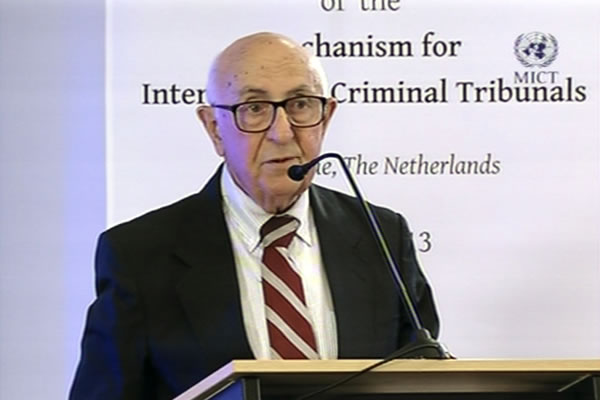Home
MERON: TRIBUNAL’S FOUNDATIONS WILL RESIST ‘TIDE OF PUBLIC OPINION’
In his speech at the ceremony marking the launch of The Hague branch of the so-called Mechanism for the International Criminal Tribunals, President Meron made reference to the criticisms the Tribunal has faced recently, noting that the ‘the tides of public opinion may shift and sway, but the foundations built by the ICTY and the ICTR […] remain unshakeable
 Theodor Meron
Theodor Meron The Hague branch of the so-called Mechanism for the International Criminal Tribunals (MICT) was formally launched at a ceremony in the Tribunal’s main lobby. The Mechanism will continue performing some of the key judicial functions of the Tribunal in The Hague. The other branch of the Mechanism was launched a year ago in Arusha, the seat of the Tribunal for Rwanda.
Judge Theodor Meron opened the ceremony in his dual role as the President of the Tribunal in The Hague and the president of the both branches of the Mechanism for the International Criminal Tribunals. The guests also heard speeches by the representatives of the host country and host city, the UN under-secretary for legal affairs Patricia O'Brien, the MICT prosecutor Hassan Bubacar Jallow and its registrar, John Hocking. All of them had nothing but praise as they described the Tribunal’s achievements in the past 20 years, the end of the ‘era of impunity’ and the beginning of the ‘new age of responsibility’ in which no one – not even those at the highest-level trials – wouldn’t be ‘above the law’. As Judge Meron said, the Mechanism for the International Tribunals will make sure that the ‘closure of the Tribunal doesn’t open the door to impunity’.
In a reference to the criticism the Tribunal has faced over the past month, President Meron noted that the ‘tides of public opinion may shift and sway, but the foundations built by the ICTY and the ICTR […] remain unshakeable.
The address by the chief prosecutor Serge Brammertz diverged from the celebratory tone of the speeches customary for such occasions. Highlighting the problems that may reduce the public trust in international justice, Brammertz warned that the Tribunal risked undermining its substantial impact if the victims and the communities in the region and the international public failed to understand its justice. This, in Brammertz’s view, was ‘especially important when the Tribunal’s decisions are controversial’. The launch of the Mechanism is an opportunity to think deeper about the ways to ‘close the gap between The Hague and the countries of the former Yugoslavia by bringing justice closer to the survivor communities’, Brammertz noted. The chief prosecutor believes that this can be achieved and should be accomplished through ‘effective dialogue, active communication and openness to critique of the Tribunal’s work’.Linked Reports
- Case : Miscellaneous
- 2013-06-24 OTP WILL NOT JOIN THE DEBATE BUT…
- 2013-06-19 TRIBUNAL’S STRATEGY: HEAD IN THE SAND
- 2013-06-17 A QUESTION FOR JUDGES: ‘AND WHAT HAVE YOU DONE?’
- 2013-07-11 WHERE IS THE TRIBUNAL HEADING FOR?
- 2013-07-26 INSTEAD OF RESIGNATION, MERON OFFERS VICTIMS ‘NEW CHAPTER’
- 2013-08-22 MORALE SLUMP AT THE TRIBUNAL
